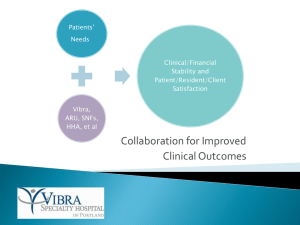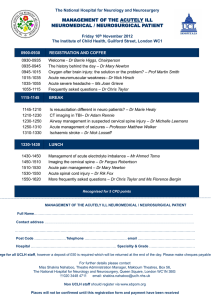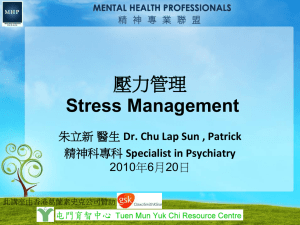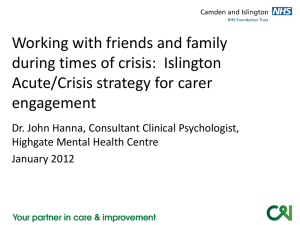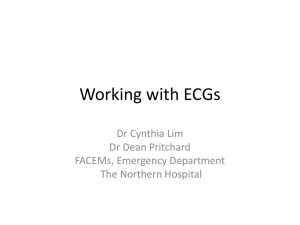W21_Soisson_Post
advertisement
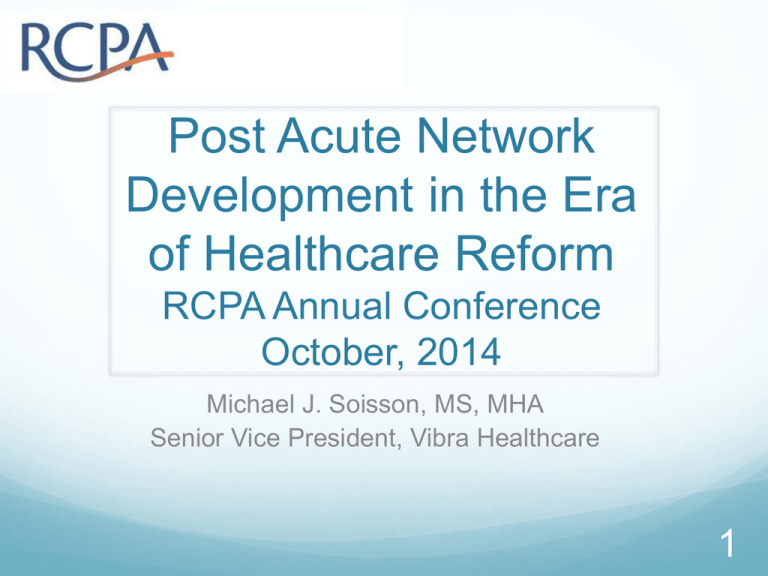
Post Acute Network Development in the Era of Healthcare Reform RCPA Annual Conference October, 2014 Michael J. Soisson, MS, MHA Senior Vice President, Vibra Healthcare 1 Agenda Post Acute Care: Definition Post Acute Care History and Evolution Regulatory and Financial Environment Post Acute Partnerships Demonstrating Value Keys to Success 2 Post Acute Definition LTACH IRF Medical SNF HHA Hospice LTC CCRC Residential Asst Living Indep. Living Group Home Home 3 Post Acute Care (PAC) by the Numbers PAC 20-25% of the total medical expense for a Medicare beneficiary. PAC spending, with annual growth in the last decade outpacing other service categories by 50% or more, now accounts for a significant portion of overall Medicare expenditures. $65 Billion 4 25% Post Acute Care (PAC) by the Numbers Up to 40% CMS Believes • Over-utilization of SNF days • 25% of SNF admits could go home 5 $10 Billion • Amount Saved by Medicare annually if patients utilize the appropriate PAC setting Over 8% • The rate at which Medicare spending for SNF, LTC, and Home Health grew annually from 2001-2012 Post Acute Care (PAC) by the Numbers Percent spending by Medicare on Post Acute IRF 11% LTACH 8% $13.1 billion SNF 50% HHA 31% $4.5 billion Medicare PAC Spending 2012 6 $8 billion Medicare’s Annual Post-acute Expenditures: $65 billion CMS Spending In 2010, 57% of all spending was on 10% of the enrollees 82% of all spending was on the top 25% of the enrollees 27.3% of the enrollees were in the 75 – 84 age group but this group accounts for 32.1% of the cost. And Enrollment in Medicare is going to EXPLODE 47.4 million enrollees in 2010 63.9 million by 2020 (35% increase) And Medicaid grow is projected at 20% 7 Financial/Reimbursement Historical Payment (HCFA – CMS) TEFRA PPS This model promotes silos of care Today LTACH IRF SNF HHA $40,000/case $14,500/case $450 per day ($10,000 per case) $2800 per episode of care (60 days) 8 Current Regulatory Environment LTACH Revised Patient admission criteria (2015) IRF Presumptive compliance change (2015) SNF Readmission Penalties 9 Acute Care Hospitals Value Based Purchasing (quality metrics) Readmission Penalties Penalties for poor outcomes/hospital acquired conditions Reduced/elimination of DSH payments Physician shortage and employment wars Pressure to merge/acquire or be acquired 10 Post Acute Need 11 Post Acute Partnership Evolution Phase I Build it and they will come Phase II Preferred Providers Phase III Hospital within Hospital Phase IV Joint Venture Facilities Phase V Post Acute Networks Future Shared Risk/Reward 12 The Future Is Now 13 ACA = ACO 338 Medicare Shared Savings ACO’s (end of 2013) 4.9 million assigned beneficiaries in 47 states In 2014 15.4 Million Medicare enrollees shifted to Medicare Advantage plans 20 Million Medicare Enrollees are now in some kind of “managed” plan Managed Medicare is very different from managed commercial (healthy) care Medicare patients = managing chronic disease Chronic disease management = post acute need 14 Post Acute Projects (CMS) Bundled Payments Model 2 Hospital + MD + Post Acute Provider + readmissions Model 3 Post Acute Provider + readmissions Medicare CARE Tool Common Assessment Tool for Post Acute IMPACT Legislation Coordination of Standardized Post Acute data Requirement of a Standardized Assessment Tool Define Reporting Provisions and Quality measures Define Post Acute Payment Systems 15 STAC Hospital Choices Develop their own Post Acute Continuum and prepare to go at risk Partner with Post Acute Providers who would manage the Post Acute Process and go at risk Preferred Provider Agreements Joint Ventures (Shared risk/reward) Partner with Payer Sponsored ACO’s and let them manage the care 16 Post Acute Provider Options Do Nothing and hope to be included in all equations Establish Preferred Provider affiliations with STACH and growing local ACO’s Be proactive and present Post Acute Management to STACHs and ACOs. Options Bundled Payment (part of Model 2 with STACH) Bundled Payment (Model 3 Just for Post Acute) Case Rate for ALL post acute service including home Capitation for all post acute service CREATING VALUE WILL BE KEY TO SUCCESS 17 PAC Value Calculation 18 Post Acute Partnership: Value Shorten LOS Reduced Costs Improve patient throughput Reduce Readmissions Keep patients within the system Manage chronic disease 19 LOS Impact Analysis LOS Impact Total Patients LOS > 6 & GMLOS Total Excess Days Variable Cost Per Excess Day Total Savings Potential 25% Capture 1,016 5,755 $600 $3,453,000 $863,250 Reducing LOS reduces census. Cost savings are on variable cost and requires actual reduction in staff/supplies; etc to achieve savings New Patient Replacement Total Patients LOS > 6 & GMLOS Total Excess Days ADC of Excess Days Replacement Patients Net Rev per Admission Total New Revenue 1,016 5,755 15.8 1151 $6,500 $7,481,500 New Patient replacement assumes additional patients are available to fill beds that are open due to reduced LOS. (Estimate 1151 new patients (at ALOS of 5 days) 20 Reduce Readmission Impact ACO Total MC & MA Discharges Total PAC Discharges % MC & MA Discharged from IP to PAC # Touched per Month 35,900 16,000 44% 1334 % Readmitted from PAC 16% # Readmitted from PAC 2560 $ Saved by Readmission Avoidance of 1% (ACO savings potential) $24,000 per case, savings $3.8 mil 1% savings Reduced Readmission (STACH Impact) Medicare Discharges 11,189 Total Medicare Payment $77,204,832 Payment at Risk (3%) $2,316,145 Readmissions previous Year 1,902 (17%) Readmission Penalty per discharge $1,218 Readmission Savings if reduce 1% $135,744 1% Reduction in readmissions = 1702 v 1902. 112 fewer readmissions @ $1,218 penalty per readmission = $135,744 22 Keys to Success Shared Goals/Shared Philosophy Clinical Information;- at the patient level Understanding cost;- at the facility level and at the patient level Control (or at least a seat at the table) of Acute Care Discharge Planning Process 23 Today STAC Hospital is paid on per discharge basis +/- $6,000 per case regardless of LOS (until cost outlier) Penalized for readmission within 30 days Incentive is to discharge the patient (ANYWHERE) as quickly as possible while avoiding 30 day readmission Discharge to home if possible and manage there or discharge to Post Acute Facilities that can best manage patient and not readmit Example: If patient can be discharged in 4 days, hospital receives $6,000 payment ($1,500 per day) vs discharged in 6 days or $1,000 per day 24 Future Under a managed care, per member per month, or in the ACO model If paid per member per month basis: Incentive is to: 1. Avoid acute care admissions if possible Only critically ill patients will be admitted 2. If admitted, shortest LOS possible (again, avoiding readmissions) and ideally, discharged HOME. 3. If not home, discharge (as quickly as possible) to the Post Acute Bed that is the BEST VALUE Discharge to facility that will get the patient home and keep them home as quickly and as low cost as possible Key to success will be MANAGING the Care 25 Some Examples for the Future SNF @ $600 per day and it takes 20 days to get the patient home ($12,000) Average SNF discharge to home = 35% Average SNF readmission rate is 30% IRF @ $13,000 per case (ave for orthopedic case) with ALOS of 12 days Average IRF discharge to home = 75% Readmission Rates for IRF nationally are < 10% 26 Future (Catastrophic Cases in Acute) Patients on Vents for longer time or in the ICU, consider: LTCH ICU cost is $3,000 per day v LTCH at $1,800 per day for a ventilator dependent patient Goal would be to keep moving patient to lower cost service that will get and keep the patient home LTCH, IRF, SNF, Home Example: Ventilator Patient in an ICU Service LOS cost/day Total cost ICU 20 $3,000 $60,000 SNF 20 $600 $12,000 Total 40 $72,000 Ventilator Patient transitioned from ICU Service LOS cost/day Total cost ICU 6 $3,000 $18,000 LTCH 21 $1,800 $37,800 IRF 12 $1,000 $12,000 Total 39 $67,800 27 Post Acute Definition LTACH IRF Medical SNF HHA Hospice LTC CCRC Residential Asst Living Indep. Living Group Home Home Ultimately: Case Rate of $___ from STACH D/C to 90 days at Home 28 The Future Is Now 29 The Future is Now? Bundled Payment for Post Acute Care By Diagnostic (chronic) condition Part of a Bundled Payment for Diagnostic Condition with STACH from admission to home Case Rate for ALL post acute care by Diagnostic Condition Capitation for all care? 30 Mike Soisson SVP Vibra Healthcare msoisson@vibrahealth.com 717-798-1278 31
